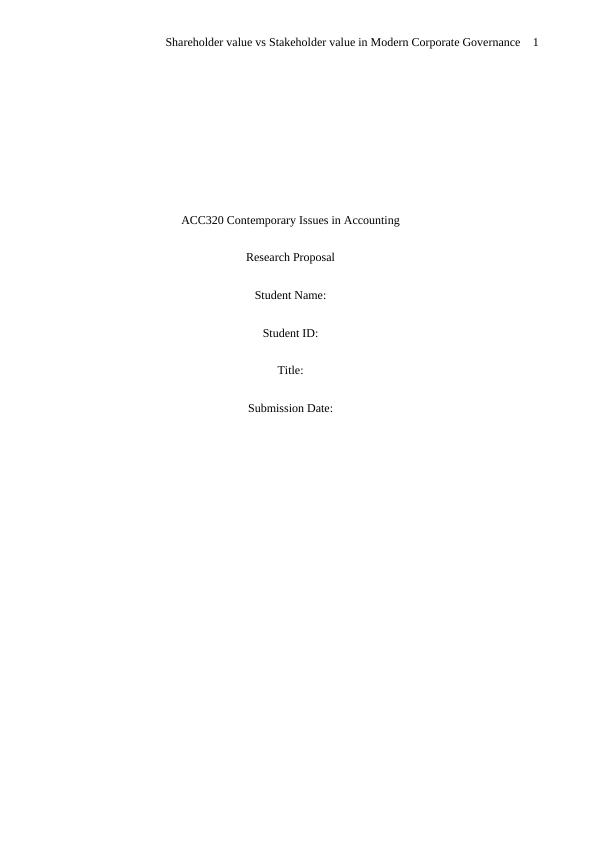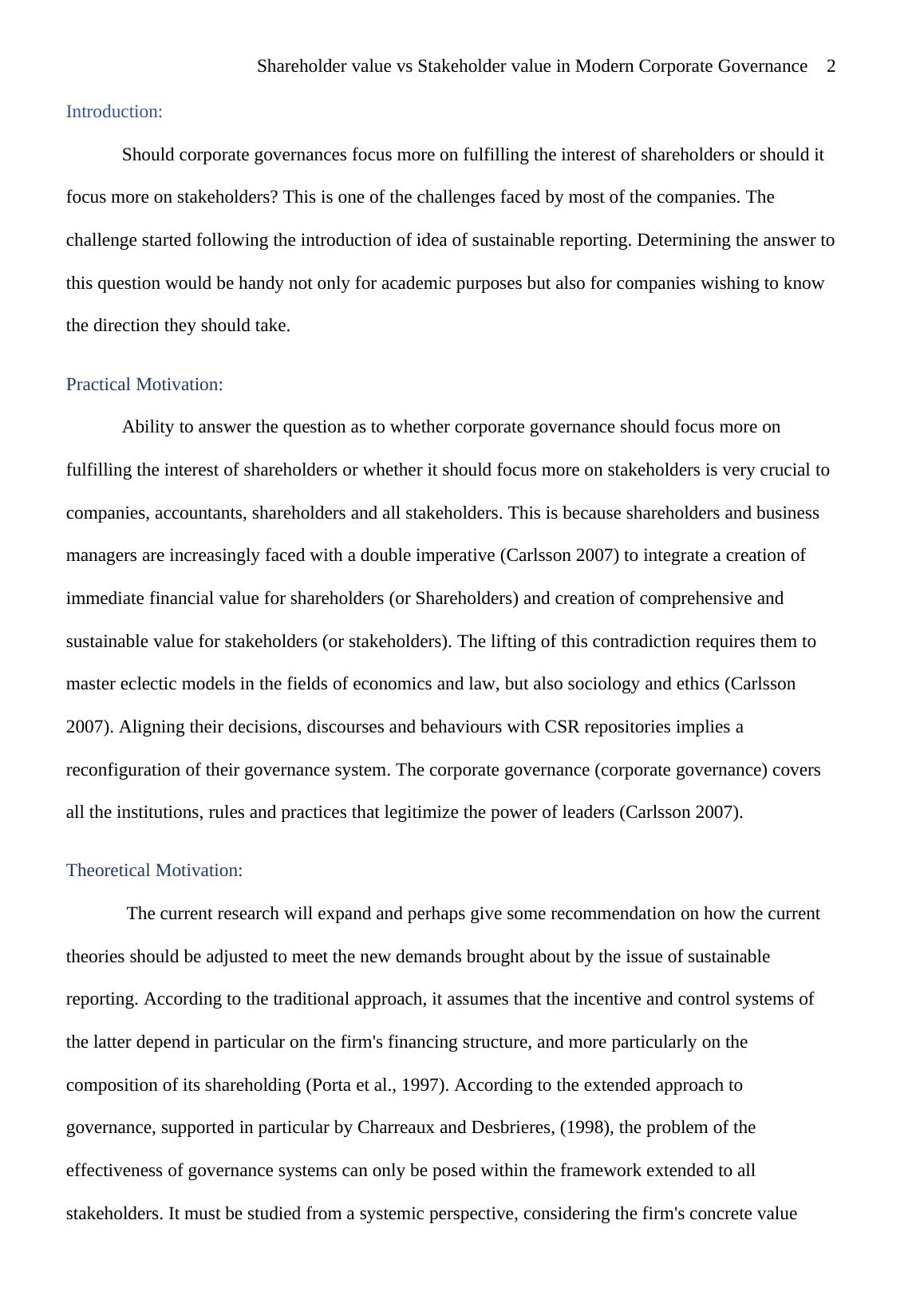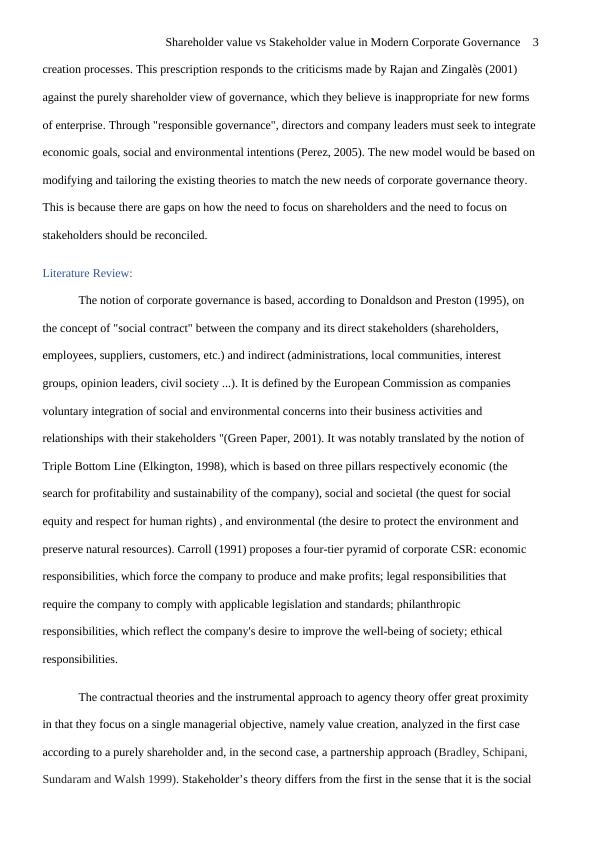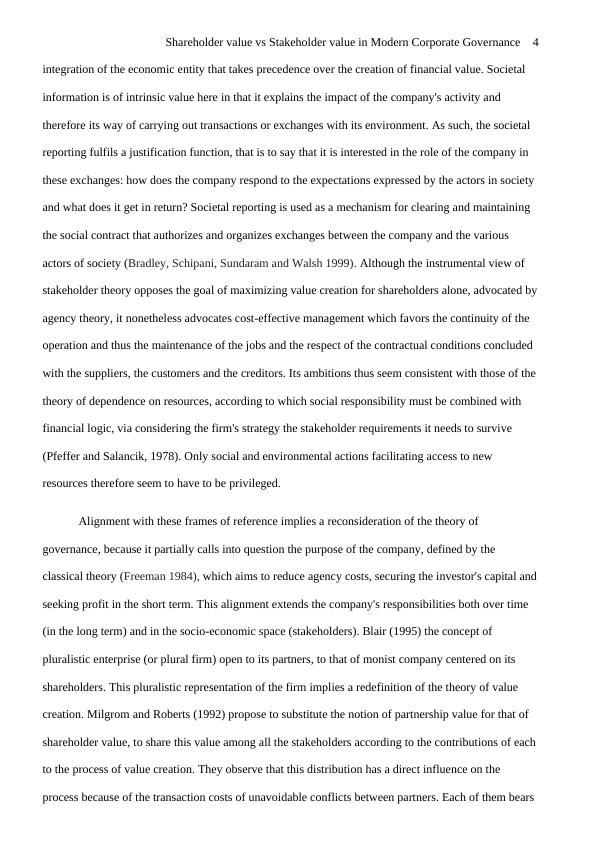Shareholder value vs Stakeholder value in Modern Corporate Governance
Added on 2023-06-04
14 Pages3396 Words255 Views
Shareholder value vs Stakeholder value in Modern Corporate Governance 1
ACC320 Contemporary Issues in Accounting
Research Proposal
Student Name:
Student ID:
Title:
Submission Date:
ACC320 Contemporary Issues in Accounting
Research Proposal
Student Name:
Student ID:
Title:
Submission Date:

Shareholder value vs Stakeholder value in Modern Corporate Governance 2
Introduction:
Should corporate governances focus more on fulfilling the interest of shareholders or should it
focus more on stakeholders? This is one of the challenges faced by most of the companies. The
challenge started following the introduction of idea of sustainable reporting. Determining the answer to
this question would be handy not only for academic purposes but also for companies wishing to know
the direction they should take.
Practical Motivation:
Ability to answer the question as to whether corporate governance should focus more on
fulfilling the interest of shareholders or whether it should focus more on stakeholders is very crucial to
companies, accountants, shareholders and all stakeholders. This is because shareholders and business
managers are increasingly faced with a double imperative (Carlsson 2007) to integrate a creation of
immediate financial value for shareholders (or Shareholders) and creation of comprehensive and
sustainable value for stakeholders (or stakeholders). The lifting of this contradiction requires them to
master eclectic models in the fields of economics and law, but also sociology and ethics (Carlsson
2007). Aligning their decisions, discourses and behaviours with CSR repositories implies a
reconfiguration of their governance system. The corporate governance (corporate governance) covers
all the institutions, rules and practices that legitimize the power of leaders (Carlsson 2007).
Theoretical Motivation:
The current research will expand and perhaps give some recommendation on how the current
theories should be adjusted to meet the new demands brought about by the issue of sustainable
reporting. According to the traditional approach, it assumes that the incentive and control systems of
the latter depend in particular on the firm's financing structure, and more particularly on the
composition of its shareholding (Porta et al., 1997). According to the extended approach to
governance, supported in particular by Charreaux and Desbrieres, (1998), the problem of the
effectiveness of governance systems can only be posed within the framework extended to all
stakeholders. It must be studied from a systemic perspective, considering the firm's concrete value
Introduction:
Should corporate governances focus more on fulfilling the interest of shareholders or should it
focus more on stakeholders? This is one of the challenges faced by most of the companies. The
challenge started following the introduction of idea of sustainable reporting. Determining the answer to
this question would be handy not only for academic purposes but also for companies wishing to know
the direction they should take.
Practical Motivation:
Ability to answer the question as to whether corporate governance should focus more on
fulfilling the interest of shareholders or whether it should focus more on stakeholders is very crucial to
companies, accountants, shareholders and all stakeholders. This is because shareholders and business
managers are increasingly faced with a double imperative (Carlsson 2007) to integrate a creation of
immediate financial value for shareholders (or Shareholders) and creation of comprehensive and
sustainable value for stakeholders (or stakeholders). The lifting of this contradiction requires them to
master eclectic models in the fields of economics and law, but also sociology and ethics (Carlsson
2007). Aligning their decisions, discourses and behaviours with CSR repositories implies a
reconfiguration of their governance system. The corporate governance (corporate governance) covers
all the institutions, rules and practices that legitimize the power of leaders (Carlsson 2007).
Theoretical Motivation:
The current research will expand and perhaps give some recommendation on how the current
theories should be adjusted to meet the new demands brought about by the issue of sustainable
reporting. According to the traditional approach, it assumes that the incentive and control systems of
the latter depend in particular on the firm's financing structure, and more particularly on the
composition of its shareholding (Porta et al., 1997). According to the extended approach to
governance, supported in particular by Charreaux and Desbrieres, (1998), the problem of the
effectiveness of governance systems can only be posed within the framework extended to all
stakeholders. It must be studied from a systemic perspective, considering the firm's concrete value

Shareholder value vs Stakeholder value in Modern Corporate Governance 3
creation processes. This prescription responds to the criticisms made by Rajan and Zingalès (2001)
against the purely shareholder view of governance, which they believe is inappropriate for new forms
of enterprise. Through "responsible governance", directors and company leaders must seek to integrate
economic goals, social and environmental intentions (Perez, 2005). The new model would be based on
modifying and tailoring the existing theories to match the new needs of corporate governance theory.
This is because there are gaps on how the need to focus on shareholders and the need to focus on
stakeholders should be reconciled.
Literature Review:
The notion of corporate governance is based, according to Donaldson and Preston (1995), on
the concept of "social contract" between the company and its direct stakeholders (shareholders,
employees, suppliers, customers, etc.) and indirect (administrations, local communities, interest
groups, opinion leaders, civil society ...). It is defined by the European Commission as companies
voluntary integration of social and environmental concerns into their business activities and
relationships with their stakeholders "(Green Paper, 2001). It was notably translated by the notion of
Triple Bottom Line (Elkington, 1998), which is based on three pillars respectively economic (the
search for profitability and sustainability of the company), social and societal (the quest for social
equity and respect for human rights) , and environmental (the desire to protect the environment and
preserve natural resources). Carroll (1991) proposes a four-tier pyramid of corporate CSR: economic
responsibilities, which force the company to produce and make profits; legal responsibilities that
require the company to comply with applicable legislation and standards; philanthropic
responsibilities, which reflect the company's desire to improve the well-being of society; ethical
responsibilities.
The contractual theories and the instrumental approach to agency theory offer great proximity
in that they focus on a single managerial objective, namely value creation, analyzed in the first case
according to a purely shareholder and, in the second case, a partnership approach (Bradley, Schipani,
Sundaram and Walsh 1999). Stakeholder’s theory differs from the first in the sense that it is the social
creation processes. This prescription responds to the criticisms made by Rajan and Zingalès (2001)
against the purely shareholder view of governance, which they believe is inappropriate for new forms
of enterprise. Through "responsible governance", directors and company leaders must seek to integrate
economic goals, social and environmental intentions (Perez, 2005). The new model would be based on
modifying and tailoring the existing theories to match the new needs of corporate governance theory.
This is because there are gaps on how the need to focus on shareholders and the need to focus on
stakeholders should be reconciled.
Literature Review:
The notion of corporate governance is based, according to Donaldson and Preston (1995), on
the concept of "social contract" between the company and its direct stakeholders (shareholders,
employees, suppliers, customers, etc.) and indirect (administrations, local communities, interest
groups, opinion leaders, civil society ...). It is defined by the European Commission as companies
voluntary integration of social and environmental concerns into their business activities and
relationships with their stakeholders "(Green Paper, 2001). It was notably translated by the notion of
Triple Bottom Line (Elkington, 1998), which is based on three pillars respectively economic (the
search for profitability and sustainability of the company), social and societal (the quest for social
equity and respect for human rights) , and environmental (the desire to protect the environment and
preserve natural resources). Carroll (1991) proposes a four-tier pyramid of corporate CSR: economic
responsibilities, which force the company to produce and make profits; legal responsibilities that
require the company to comply with applicable legislation and standards; philanthropic
responsibilities, which reflect the company's desire to improve the well-being of society; ethical
responsibilities.
The contractual theories and the instrumental approach to agency theory offer great proximity
in that they focus on a single managerial objective, namely value creation, analyzed in the first case
according to a purely shareholder and, in the second case, a partnership approach (Bradley, Schipani,
Sundaram and Walsh 1999). Stakeholder’s theory differs from the first in the sense that it is the social

Shareholder value vs Stakeholder value in Modern Corporate Governance 4
integration of the economic entity that takes precedence over the creation of financial value. Societal
information is of intrinsic value here in that it explains the impact of the company's activity and
therefore its way of carrying out transactions or exchanges with its environment. As such, the societal
reporting fulfils a justification function, that is to say that it is interested in the role of the company in
these exchanges: how does the company respond to the expectations expressed by the actors in society
and what does it get in return? Societal reporting is used as a mechanism for clearing and maintaining
the social contract that authorizes and organizes exchanges between the company and the various
actors of society (Bradley, Schipani, Sundaram and Walsh 1999). Although the instrumental view of
stakeholder theory opposes the goal of maximizing value creation for shareholders alone, advocated by
agency theory, it nonetheless advocates cost-effective management which favors the continuity of the
operation and thus the maintenance of the jobs and the respect of the contractual conditions concluded
with the suppliers, the customers and the creditors. Its ambitions thus seem consistent with those of the
theory of dependence on resources, according to which social responsibility must be combined with
financial logic, via considering the firm's strategy the stakeholder requirements it needs to survive
(Pfeffer and Salancik, 1978). Only social and environmental actions facilitating access to new
resources therefore seem to have to be privileged.
Alignment with these frames of reference implies a reconsideration of the theory of
governance, because it partially calls into question the purpose of the company, defined by the
classical theory (Freeman 1984), which aims to reduce agency costs, securing the investor's capital and
seeking profit in the short term. This alignment extends the company's responsibilities both over time
(in the long term) and in the socio-economic space (stakeholders). Blair (1995) the concept of
pluralistic enterprise (or plural firm) open to its partners, to that of monist company centered on its
shareholders. This pluralistic representation of the firm implies a redefinition of the theory of value
creation. Milgrom and Roberts (1992) propose to substitute the notion of partnership value for that of
shareholder value, to share this value among all the stakeholders according to the contributions of each
to the process of value creation. They observe that this distribution has a direct influence on the
process because of the transaction costs of unavoidable conflicts between partners. Each of them bears
integration of the economic entity that takes precedence over the creation of financial value. Societal
information is of intrinsic value here in that it explains the impact of the company's activity and
therefore its way of carrying out transactions or exchanges with its environment. As such, the societal
reporting fulfils a justification function, that is to say that it is interested in the role of the company in
these exchanges: how does the company respond to the expectations expressed by the actors in society
and what does it get in return? Societal reporting is used as a mechanism for clearing and maintaining
the social contract that authorizes and organizes exchanges between the company and the various
actors of society (Bradley, Schipani, Sundaram and Walsh 1999). Although the instrumental view of
stakeholder theory opposes the goal of maximizing value creation for shareholders alone, advocated by
agency theory, it nonetheless advocates cost-effective management which favors the continuity of the
operation and thus the maintenance of the jobs and the respect of the contractual conditions concluded
with the suppliers, the customers and the creditors. Its ambitions thus seem consistent with those of the
theory of dependence on resources, according to which social responsibility must be combined with
financial logic, via considering the firm's strategy the stakeholder requirements it needs to survive
(Pfeffer and Salancik, 1978). Only social and environmental actions facilitating access to new
resources therefore seem to have to be privileged.
Alignment with these frames of reference implies a reconsideration of the theory of
governance, because it partially calls into question the purpose of the company, defined by the
classical theory (Freeman 1984), which aims to reduce agency costs, securing the investor's capital and
seeking profit in the short term. This alignment extends the company's responsibilities both over time
(in the long term) and in the socio-economic space (stakeholders). Blair (1995) the concept of
pluralistic enterprise (or plural firm) open to its partners, to that of monist company centered on its
shareholders. This pluralistic representation of the firm implies a redefinition of the theory of value
creation. Milgrom and Roberts (1992) propose to substitute the notion of partnership value for that of
shareholder value, to share this value among all the stakeholders according to the contributions of each
to the process of value creation. They observe that this distribution has a direct influence on the
process because of the transaction costs of unavoidable conflicts between partners. Each of them bears

End of preview
Want to access all the pages? Upload your documents or become a member.
Related Documents
Corporate Governance Theories and Their Contributions to Organizational Effectivenesslg...
|14
|3471
|260
The role of leadership values and beliefs in effective governancelg...
|9
|3012
|256
Management - Critical Management in Global Contextlg...
|4
|463
|18
Stewardship and Governancelg...
|12
|2946
|63
Corporate Social Responsibility and Environmental Managementlg...
|14
|2947
|15
Corporate Social Responsibility and its Relevance in Sustainability Reportinglg...
|7
|1880
|289
